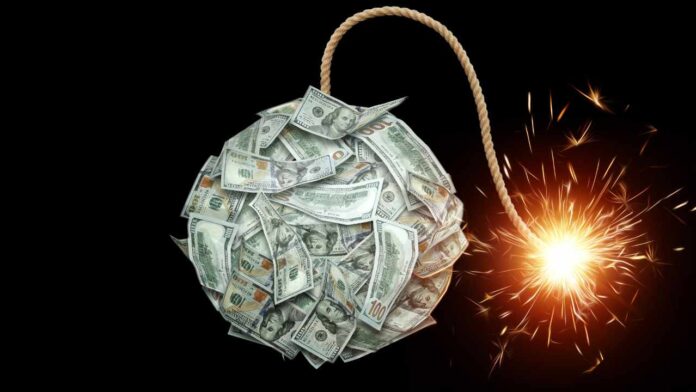Economist Peter Schiff Warns of ‘Inevitable’ US Dollar Collapse
In recent weeks, prominent economist and gold bug, Peter Schiff, has been sounding the alarm bells about the state of the U.S. economy and the potential collapse of the U.S. dollar. His warnings come in the wake of credit rating agency Fitch downgrading the United States’ long-term foreign-currency issuer default rating from AAA to AA+. As we delve into Peter Schiff concerns, it becomes evident that the trajectory of U.S. government deficit spending is setting the stage for an inevitable dollar collapse. In this article, we will explore Peter Schiff views on the U.S. rating downgrade, the potential crash, and the underlying factors that could lead to a financial catastrophe.
Fitch Rating Downgrade: Meaningless or Warning Sign?
While some may dismiss Fitch’s downgrade of U.S. Treasuries to AA+ from AAA as “meaningless,” Peter Schiff sees it as a crucial indicator of the underlying challenges faced by the U.S. economy. He argues that when it comes to rating sovereign credit, the primary risk is not default, but rather currency depreciation. Given the alarming trajectory of U.S. government deficit spending, Schiff firmly believes that a dollar collapse is inevitable. He takes a bold stance, referring to Treasuries as “junk bonds,” signaling his lack of faith in their long-term stability.
The Concerns about Rising National Debt
Peter Schiff concerns extend beyond the rating downgrade. He emphasizes that credit ratings may not matter significantly, as the U.S. probably won’t default on its obligations. However, the mounting national debt is a cause for concern. The U.S. government’s tendency to resort to printing money as a way to manage its debt obligations is a double-edged sword. On the one hand, it may prevent a default, but on the other hand, it drives down the value of the dollar, reducing the real value of Treasuries. In Peter Schiff eyes, this situation could lead to an outcome akin to default, especially if hyperinflation takes hold.
The U.S. Economy: Headed Towards a Crash?
Apart from the looming dollar collapse, Schiff paints a grim picture of the U.S. economy’s future. He predicts that rising Treasury yields will have cascading effects, leading to larger federal budget deficits, a weaker economy, a falling dollar, rising current account deficits, higher unemployment, and lower stock and real estate prices. This downward spiral, in Peter Schiff view, could culminate in a full-blown financial crisis. He even predicts that the Federal Reserve will resort to ramping up quantitative easing to mitigate the crisis, which could fuel higher inflation.
Implications for Investors and the General Public
Given the severity of Schiff’s warnings, investors and the general public must be vigilant about their financial decisions. For investors, diversification into alternative assets like gold and other precious metals might provide a hedge against the potential risks posed by a dollar collapse and financial crisis. Similarly, being cautious about overexposure to U.S. Treasuries may be prudent, considering Schiff’s skepticism about their long-term stability.
Analyzing Schiff’s Predictions: Controversy and Contradiction
Despite Peter Schiff’s reputation as an astute economist, his predictions have often been controversial and sometimes contradictory. It’s essential to approach his forecasts with a critical eye and consider alternative perspectives from other economists and financial experts. While Schiff’s concerns about the U.S. economy’s vulnerabilities are valid, the timeline and magnitude of the potential collapse are subjects of ongoing debate within the financial community.
The Role of Government and Fiscal Policy
Beyond individual actions, Schiff’s warnings call attention to the role of government and fiscal policy in shaping the economic future of the United States. Addressing the soaring national debt and implementing prudent fiscal measures could help mitigate the risks associated with deficit spending. Moreover, fostering an environment that promotes economic growth and stability could play a vital role in preventing a full-scale financial crisis.
Conclusion
In conclusion, economist Peter Schiff’s warnings about the impending collapse of the U.S. dollar and the potential for a financial crisis have garnered significant attention in recent times. While some may dismiss his views, it’s essential to consider the underlying factors that contribute to his concerns, such as the trajectory of U.S. government deficit spending and its impact on the value of the dollar. Whether or not his predictions come to fruition, it is undeniable that the U.S. economy faces challenges that warrant careful consideration from policymakers, investors, and the general public.








[…] Economist Peter Schiff Warns of ‘Inevitable’ US Dollar Collapse […]